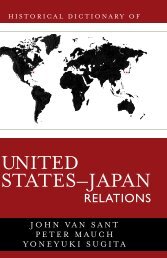Confucian Political Theory in the Face of the Future1 Mon-Han Tsai
Confucian Political Theory in the Face of the Future1 Mon-Han Tsai
Confucian Political Theory in the Face of the Future1 Mon-Han Tsai
You also want an ePaper? Increase the reach of your titles
YUMPU automatically turns print PDFs into web optimized ePapers that Google loves.
to politics as del<strong>in</strong>eated above, and for this reason alone, Jiang Q<strong>in</strong>g <strong>in</strong> his <strong>Political</strong><br />
<strong>Confucian</strong>ism (2003) stands out for his unequivocal advocate for <strong>the</strong> reconstruction <strong>of</strong><br />
<strong>Confucian</strong> state <strong>in</strong> Ch<strong>in</strong>a as well as <strong>in</strong> o<strong>the</strong>r East Asian countries 17 . In my view, <strong>the</strong><br />
book is perhaps <strong>the</strong> most significant milestone <strong>in</strong> <strong>Confucian</strong> political <strong>the</strong>ory s<strong>in</strong>ce<br />
Japanese <strong>Confucian</strong>s <strong>in</strong> <strong>the</strong> mid-19 th century such as Rai Sanyo and Aizawa Seishisai<br />
who furnished Japan and by extension, East Asia with a dist<strong>in</strong>ct form <strong>of</strong> modern state.<br />
The book deals with a bewilder<strong>in</strong>g wide range <strong>of</strong> <strong>the</strong>ories and issues <strong>in</strong> a systematic<br />
manner, so this is not <strong>the</strong> place to illum<strong>in</strong>ate every aspect <strong>of</strong> it. Here I will only hope to<br />
underscore <strong>the</strong> significance <strong>of</strong> his <strong>Confucian</strong> political <strong>the</strong>ory. It is no surprise that he<br />
opens his arguments by criticis<strong>in</strong>g New <strong>Confucian</strong>ism for mis<strong>in</strong>terpret<strong>in</strong>g <strong>Confucian</strong>ism<br />
<strong>in</strong> history, especially Confucius. For him, <strong>Confucian</strong>ism is fundamentally, orig<strong>in</strong>ally and<br />
ultimately political, because that’s what Confucius actually <strong>in</strong>tended and thought. The<br />
moral cultivation so much stressed by New <strong>Confucian</strong>s is a later development <strong>in</strong> <strong>the</strong><br />
history <strong>of</strong> <strong>Confucian</strong>ism and would only have served its purposes if right political<br />
<strong>in</strong>stitutions were enacted. He considers New <strong>Confucian</strong>ism’s debunk<strong>in</strong>g <strong>Confucian</strong><br />
political <strong>the</strong>ory or ‘<strong>Political</strong> <strong>Confucian</strong>ism’ <strong>in</strong> his word, would render <strong>Confucian</strong>ism<br />
totally irrelevant <strong>in</strong> any society let along <strong>in</strong> Ch<strong>in</strong>a. Fur<strong>the</strong>rmore, <strong>the</strong> expulsion <strong>of</strong><br />
politics from <strong>Confucian</strong>ism also <strong>in</strong>capacitates <strong>Confucian</strong>ism to be critical <strong>of</strong> social ills<br />
and problems <strong>of</strong> modernity. This would have ironic consequences for New <strong>Confucian</strong>s,<br />
because it would make New <strong>Confucian</strong>ism politically docile and <strong>in</strong>different, totally<br />
opposite to what <strong>the</strong>y labour so hard to avoid (ibid, Chapter 1).<br />
His <strong>Political</strong> <strong>Confucian</strong>ism is based on <strong>the</strong> Kongyang commentary tradition <strong>of</strong> <strong>the</strong><br />
Annals <strong>of</strong> Spr<strong>in</strong>g and Autumn, s<strong>in</strong>ce Kongyang commentary is believed by some to have<br />
conta<strong>in</strong>ed <strong>the</strong> direct verbal transmission <strong>of</strong> Confucius’s teach<strong>in</strong>g. Fur<strong>the</strong>rmore, <strong>in</strong> his<br />
view, <strong>the</strong> Kongyang tradition is most resourceful <strong>in</strong> tackl<strong>in</strong>g political and social<br />
challenges, though he also po<strong>in</strong>ts out that <strong>the</strong>re are many o<strong>the</strong>r strands <strong>in</strong><br />
<strong>Confucian</strong>ism very fertile for develop<strong>in</strong>g <strong>Political</strong> <strong>Confucian</strong>ism. Interest<strong>in</strong>gly, unlike<br />
Kang Youwei (1858-1927) <strong>in</strong> <strong>the</strong> late Q<strong>in</strong>g period who also <strong>in</strong>voked <strong>the</strong> Kongyang<br />
learn<strong>in</strong>g stressed Kongyang’s propensity to drastic political reforms and Kongyang’s<br />
<strong>the</strong>ory <strong>of</strong> various historical stages, <strong>in</strong>stead he chooses to elaborate on Kongyang’s<br />
<strong>in</strong>terpretations <strong>of</strong> historical events <strong>in</strong> <strong>the</strong> Annals <strong>of</strong> Spr<strong>in</strong>g and Autumn, which are<br />
17 The book was scheduled to be published by Pek<strong>in</strong>g University Press, but it was pulled out <strong>in</strong> <strong>the</strong> last<br />
m<strong>in</strong>ute, (Jiang, 3003, Preface) perhaps for his not-so-implicit denunciation <strong>of</strong> <strong>the</strong> communist rule <strong>in</strong><br />
Ch<strong>in</strong>a, and it was subsequently published <strong>in</strong> Taiwan. He now operates his own private college <strong>in</strong><br />
Guizhou teach<strong>in</strong>g <strong>Confucian</strong>ism.<br />
15













